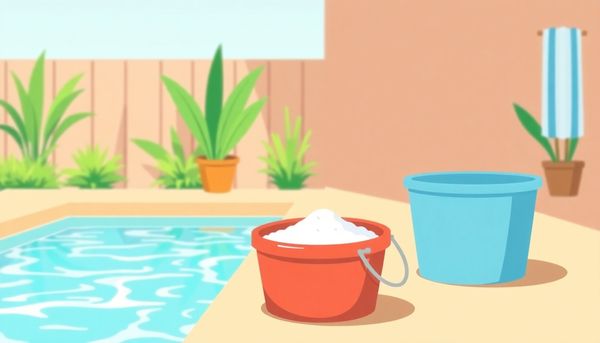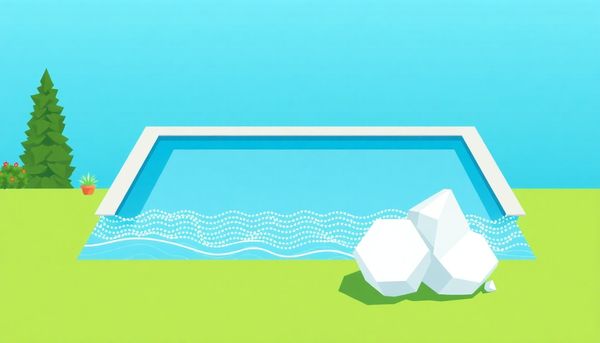Choosing the Best Pool Salt: Enhance Water Clarity & Comfort
August 16th, 2024
August 16th, 2024
Opening your backyard to a sparkling oasis of blue is a dream many pool owners cherish. A crucial part of this vision hinges not on the shimmering water, but on an essential element often overlooked—pool salt. Choosing the right salt can transform your swimming experience, ensuring crystal-clear water while maintaining a gentle touch on skin and swimsuits alike.
Years ago, I faced a frustrating battle with my pool's water clarity, cycling through countless chemicals that left my skin itchy and the pool still murky. Then, I discovered the solution was simpler than I had ever imagined: the right kind of pool salt. This revelation was a game-changer, not just for the pool's health, but for the enjoyment of everyone who took a dip.
When considering pool salt, it’s not just about any salt you can find in the pantry. The market offers specific varieties, each with unique properties tailored for different needs. Understanding these differences can ensure you’re not only preserving your pool’s integrity but also enhancing its appeal. From solar salt, which harnesses the power of natural evaporation, to mined rock salt, with its robust purity, there’s a perfect match for every pool environment.
In this guide, we’ll delve into the best pool salt options available and why they make a difference. Whether you're a seasoned pool owner or a newcomer ready to dive into the world of pool maintenance, knowing your salt could very well be the secret ingredient to an ideal swimming experience.

Among the silhouettes of choices for pool maintenance, one stands out for its crystalline purity—rock salt. Unearthed from ancient deposits, rock salt is like nature's diamond for your backyard oasis. Its purity level, typically ranging from 95% to 99% sodium chloride, makes it the ideal candidate for pool enthusiasts who want the least impurities clouding their waters.
Why is purity so essential, you wonder? Well, just think about the last time you had to deal with unwanted particles in your pool. Lower purity salts, like solar salt or mechanically evaporated salt, often drag along tiny impurities—think minerals and organic debris like the carcasses of brine shrimp. Imagine your filter grumbling under the extra workload, trying to sift out these minuscule invaders. Rock salt, however, spares the pool and its equipment this stress, thanks to its refined nature.
Once, I decided to experiment with solar salt for my pool, swayed by its economical pricing. The aftermath was a symphony of filter clogs and frequent chemical adjustments. From that point on, I pledged allegiance to rock salt. Its consistency and low maintenance spoke volumes, allowing me to indulge in more poolside relaxation rather than labor.
In the grand scheme of pool care, choosing rock salt equates to investing in ease and clarity. The sparkling water that greets you each morning feels like a reward for choosing wisely. So next time you're at the store, remember that beneath the rugged exterior of rock salt lies the promise of purity and peace of mind.
Choosing the finest pool salt isn't just a matter of picking the nearest bag labeled "salt" at the store. The right choice ensures your pool remains a refreshing oasis rather than a murky mystery. With an array of salt types available, zeroing in on the optimal one for your pool can be tricky. While solar salt is a budget-friendly option, its journey from seawater to your pool often leaves behind unwanted impurities like bacteria and tiny brine shrimp. These contaminants can burden your chlorinator and filter, demanding extra maintenance.
Then there's the mechanically evaporated salt, which employs artificial heat to hasten the evaporation process. Though effective at eliminating some impurities, it often leaves behind minerals that can upset your pool's chemical balance. These residual minerals can result in frequent filter cleaning and additional chemical balancing efforts, making it a less-than-ideal choice for the meticulous pool owner.
Rock salt, mined from the earth, emerges as the champion for pool use. Boasting purity levels between 95% and 99% sodium chloride, it provides a cleaner, more straightforward solution for pool maintenance. Its homogenous composition minimizes stress on equipment and simplifies the upkeep of your pool's chemistry. So, when the time comes to select your pool salt, reaching for those bags labeled specifically for pool use—usually rock salt—will ensure that your aquatic sanctuary remains crystal clear and inviting.
Chlorination in a saltwater pool might sound like a magical conversion, but it’s grounded in straightforward chemistry. When you add salt to your pool, it's not the salt itself doing the sanitizing. The real star is your salt water chlorinator, a device that performs electrolysis. Through this process, the chlorinator splits the salt, or sodium chloride, into sodium and chlorine. Released into your pool, the chlorine gets to work, effectively killing bacteria and other pesky microorganisms, leaving your water sparkling clean.
Think of the chlorinator as the unsung hero of your backyard oasis, quietly ensuring that your water stays pristine. This device, often equipped with self-cleaning technology, minimizes the hassle of maintenance. With features like high and low salt indicators, it also offers peace of mind by protecting your pool equipment from potential damage.
From personal experience, investing in a good quality chlorinator transforms pool maintenance. Instead of juggling multiple chemicals and constant testing, a saltwater pool setup simplifies your routine, letting you enjoy more swimming and less worrying. And while it might initially feel like a splurge, the long-term savings on chemicals and the reduced wear on your pool equipment make it a wise choice. Understanding this process demystifies the role salt plays, showcasing its importance in maintaining water quality effortlessly.
Navigating the world of pool salt can feel like deciphering a secret code, especially with so many tempting options lining the shelves. The allure of grabbing a bag of table salt might seem convenient, but it’s a classic misstep. Pool salt is specially formulated for a reason—it dissolves efficiently and keeps your chlorinator humming smoothly. Opting for the wrong type can lead to frustrating setbacks.
Consider the potential pitfalls of choosing solar or mechanically evaporated salt. While solar salt is budget-friendly, it often harbors unwanted impurities like minerals and even the remnants of tiny brine shrimp. These impurities force your pool filter to work overtime, leaving you with water that's not as pristine as you'd like. Mechanically evaporated salt, though a step up, can still bring uninvited mineral guests into your pool, complicating chemical balancing and risking equipment damage.
For those seeking hassle-free pool maintenance, rock salt emerges as the hero of the story. With a purity ranging from 95% to 99% sodium chloride, it ensures a cleaner, more reliable performance. Investing in high-quality pool salt labeled explicitly for pools is your best bet. Not only is it tailored for optimal function, but it also spares you from unnecessary maintenance battles. So, while a pool may be salty, your maintenance routine doesn’t have to be.

Choosing the right salt for your pool might seem as straightforward as grabbing the cheapest bag available, but not all salt is created equal. Solar salt, a popular yet flawed option, is often the least expensive due to its natural production method. Originating from evaporated seawater, solar salt is left with more than just the crystalline reminder of ocean tides; it harbors numerous impurities. Although the sun's heat eventually eradicates the bacteria, remnants like brine shrimp carcasses can linger in your pool salt.
Now, think about your pool's filtration system. It works tirelessly to keep your water pristine, eliminating anything that might cloud its clarity. Adding solar salt means introducing unnecessary impurities that can overburden your filter and chlorinator. This isn't just about aesthetics—it's about maintaining the efficiency and longevity of your pool equipment. Imagine the time and effort spent on additional maintenance, not to mention the cost of replacing worn-out parts earlier than expected.
For a sparkling pool with minimal fuss, investing in high-quality, purer salt options such as mined rock salt is wiser. This type of salt is not only cleaner but also has fewer impurities, ensuring your pool remains a refreshing oasis free from unwanted organic debris. Opt for quality over cost savings with solar salt, and enjoy a more enjoyable, low-maintenance swimming experience.
When it comes to maintaining the sparkling allure of a saltwater pool, choosing the right type of salt is as crucial as the correct pH balance. Enter high-purity rock salt, nature's gift that ensures your pool remains a safe, welcoming oasis. Unlike its solar and mechanically evaporated counterparts, rock salt is sourced from deep within the earth, offering an impressive purity level of 95% to 99% sodium chloride. This purity translates to fewer impurities, meaning less work for your chlorinator and filter.
A friend of mine recently switched to rock salt for his pool, and the difference was palpable. The water clarity improved, and maintenance was noticeably easier. He found himself spending more time enjoying the pool rather than laboring over it, a significant perk in the searing summer heat. High-purity rock salt minimizes the presence of unwanted minerals like calcium, which can otherwise lead to troublesome scale buildup on pool surfaces and equipment. The absence of organic impurities, such as dead shrimp or bacteria, lessens the burden on sanitizing systems, reducing wear and tear while enhancing the overall efficiency of your pool’s ecosystem.
In essence, choosing high-purity rock salt is akin to giving your pool a breath of fresh air—uncluttered and pure. It’s like trading in a hand-me-down car for a brand-new model, offering a smoother ride and fewer stops at the mechanic. So, when it’s time to replenish your pool salt, reach for those bags labeled "rock salt" and enjoy the peace of mind that comes with pristine waters.
When setting up a saltwater pool, the choice of salt is crucial for maintaining clean and healthy water. It's tempting to grab the cheapest option, often solar salt, thinking all salt is created equal. However, this approach can backfire spectacularly. Solar salt, harvested through the natural evaporation of seawater, seems eco-friendly and affordable. But lurking beneath its crystalline surface are unwelcome guests—brine shrimp and bacteria—that thrive before ultimately perishing in the high-salinity environment. While the tiny fairy shrimp might sound whimsical, the reality is far less charming. These organic impurities can burden your pool's chlorinator and filter, demanding extra effort to maintain crystal-clear water.
Consider a conversation with a neighbor who recently faced a solar salt saga. They discovered that the impurities led to increased maintenance time and costs, as their pool equipment had to work overtime to compensate for the added contaminants. Not only did this mean more frequent filter cleanings, but it also risked the stability of their pool's chemical balance. Such experiences underscore the importance of making an informed choice.
Opt for purer salt alternatives, like rock salt, which offer higher sodium chloride content with fewer impurities. By prioritizing quality over cost, you ensure your pool remains a relaxing oasis rather than an ongoing science experiment. Making a wise salt choice pays off in the long run, providing peace of mind and more time to enjoy your aquatic retreat.
Salt-water chlorination may sound like a complex process, but it’s a game-changer for pool maintenance. Imagine having a pool that feels as refreshing as a dip in the ocean, minus the sticky salt residue. When I first switched my pool to a salt-water system, I was amazed at how silky the water felt — no more unpleasant chlorine smell or red eyes.
The magic lies in the salt water chlorinator, a clever device that transforms ordinary salt into chlorine through electrolysis. This process splits sodium chloride (the salt) to release chlorine, which then keeps the pool hygienic. It’s like having a mini chemistry lab right in your backyard, quietly working to ensure your pool remains pristine.
Unlike traditional pools, which require constant dosing with liquid or tablet chlorine, salt-water systems offer a more hands-off approach. You’ll need to check salt levels and occasionally clean the chlorinator cell, but it’s far less demanding than lugging around heavy buckets of chemicals. Plus, these systems often come with features like self-cleaning cells and indicators for optimal salt and temperature levels, making maintenance even easier.
Switching to salt-water chlorination not only simplifies upkeep but also enhances your swimming experience. If you’re ready to enjoy a more natural, less abrasive swim, this could be the ideal solution for your pool.

Have you ever wondered why salt water pools are gaining popularity among homeowners? The secret lies in the numerous benefits that pool salt brings to your swimming experience. Unlike traditional chlorine pools, salt water pools offer a gentler touch to your skin and hair. Think about that moment when you dive in and feel the softness enveloping you, leaving your skin free from irritation and your hair silkier than ever.
Moreover, the appeal of pool salt extends beyond just comfort. It significantly reduces the hassle and cost associated with pool maintenance. Pool salt doesn't just vanish after it's added; it works in tandem with a salt water chlorinator to continuously sanitize the water. This clever system splits the chlorine from the sodium chloride, ensuring your pool remains clean without the constant need for manual intervention or large amounts of additional chemicals.
Speaking from personal experience, the beauty of pool salt lies in its ability to maintain water clarity. Gone are the days of red, itchy eyes after a swim. With a salt water pool, you enjoy a crystal-clear oasis that feels more natural and refreshing. Whether you're floating leisurely on a sunny afternoon or hosting a lively pool party, the benefits of using quality pool salt are evident every time you step into that sparkling water.
Choosing the right pool salt is a bit like selecting the perfect seasoning for your favorite dish. Although all salts seem similar, the type you choose can significantly impact your pool’s health and your maintenance efforts. Among the options, rock salt stands out as the shining star. Extracted from mines, this salt boasts a purity level of 95% to 99% sodium chloride, making it the cleanest choice for your pool. This high purity ensures fewer impurities, meaning your pool's chlorinator and filter don't have to work extra hard, saving you time and energy.
On the other hand, solar salt, with its romantic name, may seem appealing but is best left to other uses. Produced by the evaporation of seawater, it often contains organic impurities like brine shrimp. Imagine your pool filters battling against these tiny critters instead of serenely maintaining your oasis. Not ideal, right?
Mechanically evaporated salt, while a step up from solar salt, still brings some unwanted guests. Though it reduces bacterial presence, it leaves behind minerals that can disrupt your pool’s chemical balance. These minerals might not be as visible, but they subtly increase maintenance demands.
Ultimately, by choosing rock salt, you're not only opting for the easiest maintenance route but also ensuring your pool remains a sparkling sanctuary. It’s the difference between a smooth swim and a constant struggle with water balance. So, next time you’re in the pool supply aisle, reach for that bag of rock salt and dive into simplicity.
Ever thought about how your shimmering pool stays so pristine? Behind that crystal-clear water lies the magic of salt-water chlorination. While it sounds like something from a science fiction novel, this process is surprisingly straightforward and efficient. By converting salt into chlorine, a salt-water chlorinator transforms your pool into a self-sanitizing oasis. It’s like having a tiny, invisible team working tirelessly to keep your water clean and safe.
Salt-water chlorination isn't just about maintenance. It offers a luxurious swimming experience that’s gentler on the skin and eyes compared to traditional chlorine methods. Spending afternoons swimming without the lingering scent of chlorine or the irritating itch in your eyes becomes a reality. This system cleverly combines technology and simplicity, ensuring your pool sparkles without the hassle of constant chemical adjustments.
When I switched to a salt-water pool, I was amazed at the difference. My initial apprehension about the setup quickly dissolved, much like the salt itself. The chlorinator’s self-cleaning capabilities and indicators for salt levels and temperature make the process worry-free. For anyone looking to enhance their pool experience, exploring salt-water chlorination is not just an option; it’s a worthwhile investment in comfort and peace of mind.
Understanding the nuances of salt-pool maintenance transforms a simple backyard feature into a seamless aquatic retreat. When you choose a saltwater pool, you're opting for a system that's kinder on the skin and eyes and lighter on your wallet regarding chemical purchases. But this choice demands a deeper understanding of how to maintain that idyllic swim-ready condition.
To begin, the salt in your pool isn't doing all the heavy lifting by itself. It's in partnership with a salt water chlorinator, which leverages electrolysis to separate chlorine from sodium. This process ensures your pool remains sanitized without the sharp smell and harshness of traditional chlorine. As a friend once remarked, it feels more like a natural spring than a chemically treated reservoir.
Maintenance involves more than dumping salt into the water. Routine checks of your salt levels and the functionality of your chlorinator are crucial. Most modern systems come equipped with indicators that alert you when either salt concentration or temperature veers off course. My neighbor discovered this the hard way—his pool turned an uninviting cloudy hue because of an ignored low-salt alert.
Remember, choosing the right type of salt is equally important. While solar and mechanically evaporated salts are available, opting for rock salt is often recommended due to its high purity. This choice minimizes impurities and lessens the workload on your filtration system. Investing a little time in understanding these elements keeps your pool sparkling and inviting, ensuring many seasons of unhindered enjoyment.

It’s a dazzling day by the poolside, the sun casting shimmering patterns over the water’s surface. Yet, beneath this tranquil scenery lies a fascinating process powered by salt: chlorination. While it might seem like an incredible feat of modern science, it’s actually a delightful marriage of nature and technology. The true hero of this scenario is the salt water chlorinator, the unsung champion ensuring your pool remains a safe and enjoyable oasis.
Electrolysis is the magic word here. Through this process, the salt water chlorinator separates sodium chloride into two components, one being chlorine, which is released to sanitize the pool. The beauty of this method is its simplicity and efficiency. Not only does it reduce the need for added chemicals, but it also provides a continuous supply of chlorine, keeping your pool consistently safe and crystal-clear.
A salt water chlorinator is user-friendly, often featuring self-cleaning mechanisms and indicators for salt levels and temperature. These handy tools significantly lessen maintenance hassles, allowing more time to enjoy rather than fret over water quality. For both inground and above-ground pools, this system is adaptable, making it a versatile choice for pool owners.
Personal experience speaks volumes. Having recently switched to a salt water system, I’ve noticed a significant reduction in maintenance time and costs. My pool water feels softer, and the absence of harsh chemical odors enhances every swim. Choosing the right salt and harnessing the chlorination power not only transforms your pool into a personal retreat but also offers peace of mind.
Choosing the right pool salt might seem like a minor detail, but it can make a world of difference for your backyard oasis. Think about it: not all salt is created equal, especially when it comes to maintaining a pristine and healthy swimming pool. The first step is understanding the types available—solar salt, mechanically evaporated salt, and mined salt—each with its own quirks and qualities.
Solar salt, while budget-friendly, comes with its share of unsavory extras. Imagine tiny brine shrimp and bacteria hitching a ride in your pool. This can mean more work for your chlorinator and filter, trying to rid the water of these impurities. Mechanically evaporated salt offers a somewhat improved option. It eliminates most organic contaminants but leaves behind minerals that could disrupt your pool's chemical balance. Although better than solar salt, it may still lead to extra cleaning duties.
Mined salt emerges as the hero in this lineup. Extracted from deep within the earth, it boasts a purity level of 95% to 99% sodium chloride. This means fewer impurities and less strain on your pool equipment. Next time you’re at the store, look for pool salt labeled clearly, ensuring it’s the right grain size and composition for your chlorinator.
In conclusion, choosing high-quality mined salt not only reduces maintenance but also enhances your swimming experience, making those laps feel like a glide through crystal-clear waters. Enjoying a hassle-free pool season starts with smart salt choices.
The brilliance of a well-maintained saltwater pool lies in its chlorine generator, a device that transforms ordinary salt into a sanitizing superhero. To ensure your chlorinator runs at peak performance, there are a few strategic steps you can take.
First and foremost, the type of salt you choose matters. Rock salt, mined directly from the earth, is your best bet. Its high purity level—often between 95% to 99% sodium chloride—ensures your chlorinator isn’t overloaded with impurities that could hamper its efficiency. Lesser salts can introduce unwanted minerals or organic impurities, making the chlorinator work overtime. Picture my neighbor who opted for solar salt; he found himself cleaning his chlorinator more often than swimming.
Beyond salt selection, consistent maintenance is key. Regularly check your chlorinator’s salt and temperature indicators. These handy features alert you to any imbalances before they escalate into larger issues. And don’t forget the self-cleaning salt cell, a godsend for those weary of manual scrubbing. Think of it as your personal pool assistant, keeping things running smoothly while you bask in the sunshine.
Finally, always adhere to the recommended salt levels for your pool size. Too little salt means less chlorine production; too much can damage the equipment. By following these guidelines, you'll ensure your chlorinator remains efficient, providing you with crystal-clear water and fewer headaches.
Navigating the world of pool salt can be a bit tricky, especially with the myriad options and potential pitfalls lurking. First and foremost, avoid using table salt in your pool. While it may seem convenient, its fine granules can cause issues with your chlorinator, failing to dissolve properly and potentially leading to clogs. I once learned this the hard way; after a weekend pool party, the water clarity dramatically declined, much to my dismay.
Solar salt, with its enticingly natural production method, might seem eco-friendly. However, it harbors hidden risks. This type often contains impurities like brine shrimp and bacteria, remnants of its oceanic origins. These contaminants can burden your pool’s filtration system and reduce your sanitizing agent's effectiveness. It’s like inviting a party of unwanted guests who refuse to leave.
Mechanically evaporated salt steps up in purity but still carries mineral impurities. While it’s a step above solar salt, these minerals can disrupt your pool’s chemical balance and lead to extra maintenance, much like an unexpected detour on a planned road trip.
Rock salt, mined from the earth’s depths, emerges as the champion. Its high purity, up to 99% sodium chloride, ensures minimal impurities. But remember, not all rock salt is created equal; always ensure it’s labeled specifically for pool use. Choose wisely, and your pool will reward you with clear, inviting waters.

Diving into the world of swimming pool maintenance, one quickly discovers the allure of bulk pool salt. This isn't just about saving money—though that's certainly a perk—but about embracing efficiency and convenience. When you embrace bulk, you're opting for simplicity. Picture tossing in a single hefty bag instead of fussing with countless small containers. It’s like choosing a leisurely walk in the park over a grueling marathon.
Consider the time saved. Bags of bulk pool salt dissolve quickly, effortlessly transforming into the perfect environment for your chlorinator to work its magic. My neighbor, who was new to saltwater pools, once spent an entire afternoon struggling with regular table salt before switching to bulk. The difference was night and day, and he hasn't looked back since.
It's also about peace of mind. Knowing your salt is specifically designed for your pool's needs, free of unnecessary impurities, allows you to chill by the water's edge, cocktail in hand, rather than worrying about potential damages to your pool system. The rock salt variety, in particular, offers purity and reliability, ensuring that your weekends are spent swimming, not skimming.
Bulk pool salt is more than a cost-effective choice—it's a commitment to an easier, more enjoyable pool experience. So next time you're stocking up, skip the small stuff and go big. You’ll thank yourself every time you take that first refreshing plunge.
Selecting the right pool salt can be as crucial as picking the perfect spot for your hammock. Not all pool salts are created equal, and knowing the distinctions can make pool maintenance a breeze. Let's explore why rock salt might be your best bet for a sparkling, hassle-free pool.
Rock salt, often dubbed the diamond of pool salts, is mined directly from the earth and boasts an impressive purity, typically ranging from 95% to 99% sodium chloride. This purity level ensures fewer impurities, which translates to less stress on your pool's filtration system. Imagine the satisfaction of knowing your chlorinator isn't battling against unwanted minerals or organic remnants.
In contrast, solar salt, while economically appealing due to its nature-based production, often harbors impurities like dead brine shrimp and bacteria. These impurities can overburden your pool's systems, counteracting the very cleanliness you're striving to maintain. Mechanically evaporated salt offers some improvements by using artificial heat to eradicate organic contaminants, but it still leaves some mineral traces behind.
When you opt for rock salt, you minimize these concerns, allowing your pool to remain a relaxing oasis rather than a battleground for impurities. Whether you're luxuriating under the sun or hosting a weekend splash, knowing your pool salt choice supports a pristine environment enhances every aquatic moment. Embrace the clarity that comes with a well-informed decision and enjoy the seamless maintenance that follows.
Salt plays a transformative role in the world of pool sanitation. Unlike the grains you might sprinkle on your dinner, pool salt takes on a new identity when combined with technology. It’s not the salt itself that cleans the water; the magic happens through a device known as a salt water chlorinator. This clever gadget employs a process called electrolysis, which separates chlorine from sodium within the salt. This liberated chlorine acts as a powerful agent, keeping your pool water sparkling and germ-free.
Imagine owning a backyard oasis where maintenance feels less like a chore. The chlorinator doesn't just purify—it self-regulates, boasting features like high/low salt sensors and temperature indicators to safeguard your equipment. With these innovations, the days of juggling chlorine tablets and worrying about chemical burns become a distant memory.
Choosing the right type of salt, however, is crucial. While table salt might suffice for your homemade fries, pool salt is engineered to dissolve quickly and effectively. Opting for the purest forms, such as those derived from rock salt, ensures minimal impurities, reducing strain on your chlorinator and filter system. This purity translates to a cleaner, more efficient pool with less hassle.
In essence, understanding the role of salt in pool sanitation empowers you to make informed choices, crafting a seamless and enjoyable swimming experience.

This article provided insights into maintaining your pool. Start your pool care journey today!
Want to become a pool maintenance expert? Our free Pool School course covers everything you need to know about pool care. From basic maintenance to advanced troubleshooting, you'll learn how to:
Join over 10,000 pool owners who have already transformed their pool care routine. Get started with our free Pool School course today!